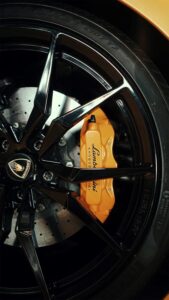Car Inspection Introduction
Car inspections are an important part of vehicle maintenance that involves checking various components of the car to ensure that it is in good working condition and meets safety standards. In this essay, we will discuss in detail what mechanics do during a car inspection.
Brakes

The braking system is a crucial component of any vehicle and it is essential to ensure that it is functioning correctly. During a car inspection, mechanics will examine the brake pads, rotors (AKA disks), and calipers (devices that allow the car to slow down by putting pressure on the wheel) to ensure that they are working properly and are not worn down.
The brake pads (yellow component in the photo) will be checked for wear, and if they are too thin, they will need to be replaced. The rotors (circular silver disk) will be checked for wear and cracks, and if necessary, they will be resurfaced or replaced. The calipers (located inside the break pads) will be checked for leaks and proper function. Brakes are essential for the safe operation of any vehicle, and a mechanic will ensure that the brakes are working correctly during a car inspection.
Suspension
The suspension system is responsible for ensuring a smooth ride and keeping the vehicle stable while driving. During a car inspection, the mechanic will check the shocks, struts, and other suspension components to make sure they are not damaged and are functioning correctly. The mechanic will also check the alignment of the wheels, which can affect the suspension system. If there are any issues with the suspension, the mechanic will need to repair or replace the necessary components.
Steering System
The steering system is responsible for controlling the direction of the vehicle. During a car inspection, the mechanic will check the steering components, including the steering rack, tie rods, and ball joints, to ensure that they are not damaged and are working correctly. The mechanic will also check the power steering fluid levels and look for any leaks. If there are any issues with the steering system, the mechanic will need to repair or replace the necessary components.
Tires
Tires are essential for the safe operation of any vehicle, and it is crucial to ensure that they are in good condition. During a car inspection, the mechanic will inspect the tires for proper inflation, tread depth, and any signs of damage or wear. If the tires are worn down, they will need to be replaced. The mechanic will also check the alignment of the wheels, which can affect the tires’ wear and tear.
Exhaust System (Does not apply to electric cars)
The exhaust system is responsible for removing harmful emissions from the vehicle. The mechanic will check the exhaust system for leaks, damage, and proper function. The mechanic will also check the catalytic converter, which helps reduce harmful emissions. If there are any issues with the exhaust system, the mechanic will need to repair or replace the necessary components.
Lights
Lights are essential for the safe operation of any vehicle and it is crucial to ensure that they are working correctly. During a car inspection, the mechanic will check all the lights on the vehicle, including the headlights, taillights, turn signals, and brake lights, to ensure that they are working correctly. If any lights are not working, they will need to be replaced.
Windshield and Wipers
The mechanic will check the windshield for cracks or chips and ensure that the wipers are working correctly. If there are any issues with the windshield or wipers, the mechanic will need to repair or replace the necessary components or recommend a shop that can do the glass repairs.
Engine (Does not apply to electric cars)
The engine is the heart of the vehicle, and it is essential to ensure that it is functioning correctly. During a car inspection, The mechanic will inspect the engine for any signs of damage or wear, as well as check fluid levels, belts, and hoses.
Overall, the purpose of a car inspection is to ensure that the vehicle is safe to operate on the road and does not pose a risk to the driver or other motorists.